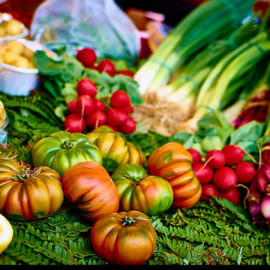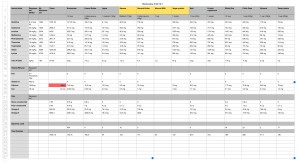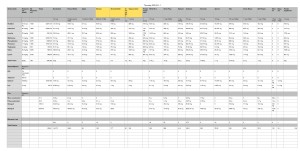I just finished a 4 week experiment with a vegetarian diet. I wanted to see for myself how difficult or not it is to follow and if it was possible to hit all the nutrient requirements, especially protein. Had it been a little easier, I would have tried a vegan diet as well, but I didn’t get that far.
It Really Is Difficult To Meet Nutrition Requirements
One of the controversies with both vegetarian and vegan diets is whether or not you can meet your nutrition requirements. I tracked a few key micro and macronutrients to see. What I found was that it is very difficult to hit the numbers.
Protein: I could get the minimum requirement of essential amino acids without much trouble with the exception of one, which was methionine. If you subtract that supplementation though, my overall protein intake was still rather low. My very best day I hit 126 grams, which works if I calculate my needs using the formula of 1 gram of protein per kilogram of body weight. However, if I go for the higher range for athletes which would be up closer to 2 grams per kilo, it’s not enough. Also, remember that this was my best day. On more normal ones, I actually came in at around 80g, which might be too low if I stick to the standard recommendations.
For more on protein check out: All About Protein at Precision Nutrition
Vitamin B12: This is non-existant in vegetarian foods. You must supplement if you are going to eat this way. Two interesting things I learned about B12 is that it comes from bacteria, which is how it is produced for supplementation, and the liver can store a large enough amount to keep you from becoming deficient for quite a while. This means that you might be able to do a vegetarian or vegan diet without becoming deficient for a long enough time to think that everything is ok, but this should not be confused with having adequate intake. If you do not supplement, eventually you will likely end up deficient and this can lead to serious nervous system damage.
Calcium: This is tough to get from plants. Fortified products or supplements are again an option.
Iron: This was one of the easiest for me to get through plant based food. As with protein though, I had to eat quite a bit throughout the day to hit the daily amount.
Fats: You’ll find good amounts of monounsaturated, polyunsaturated, omega 3, and omega 6 fatty acids in things like nuts, as well is some grains and legumes. Note that I do not have daily recommended intake for this, as it is usually given as a percentage of your daily calories. Mostly, I just wanted to see that I did in fact have healthy fat in my diet.
Calories: Calories are difficult to calculate unless you want to weigh your food. I would say though that even guessing high, it’s not easy to get calories on a plant based diet. Again, you are going to need to be eating a lot in order to get the number up. I’d say you probably need to eat every 2-3 hours just to keep up. On my best day, I did hit a pretty good number, but I ate a lot and I wasn’t able to do that reliably every day.
Digestion Is An Issue
Given the sheer amount of food that must be eaten and the fact that human beings are not particularly good at digesting plants, gastric distress like gas and bloating becomes part of the deal. By the end of the day, I felt pretty blimpy…
I Did Not Lose Weight
This is a very complicated issue and I almost did not write about it here, but I figured I should probably at least touch on it. I did not lose weight as a vegetarian. I went from 212 pounds to 200 in the first week, then back up to 210 in the middle of the 4 weeks, and finally settled back in at 209 at the end of the 4 weeks. This is pretty much normal fluctuation for me. I did feel good though (except for the stomach issues). My opinion on diet and exercise is that one should focus on developing good habits and not on having to be a certain weight. There appears to be mounting evidence out there that the body is very good at finding and maintaining a weight that it wants to be. You can force it to do other things, but it takes extremes and it is not necessarily healthy. I recommend focusing on health and not on having to look a certain way.
Why You Exercise So Much And Still Can’t Lose Weight – CNN
The Charts
Click on the pictures to see a full size (That you can actually read)
Chart 1
Chart 2
Conclusion/The Upside
For me, what I really appreciated was rebalancing my diet towards more plants. I was always looking for protein, which made it easy to be eating mostly meat with a few vegetables sprinkled in. The opposite should be the case – lots of veggies with some meat sprinkled in. What I would say though, is that it is very difficult to hit your daily nutritional requirements eating this way. It’s a lot of eating and even so, you still tend to come up short in some key categories. Supplementation is an option, but that comes with it’s own set of questions. I want to write a lot more about the whole subject, so look for those below. I will drop in the links as I get them written!
More Lessons From My Vegetarian Diet Experiment To Come!
PHOTO: Moyan Brenn, Diet. License



Pingback: Is A Vegetarian Diet Bad? - do the movement April 1, 2016
[…] This post is the 2nd in a series about my vegetarian experience. The first is: Vegetarian Diet – What I Learned. […]
Pingback: How Much Protein Do I Need? - do the movement December 1, 2016
[…] Vegetarian Diet – What I Learned […]